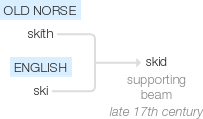Skid
late 17th century (as a noun in the sense ‘supporting beam’): perhaps related to Old Norse skíth (see ski).
wiktionary
From Middle English *skid, from Old Norse skíð(“a billet of wood, a beam or plank on which something rests”), from Proto-Germanic *skīdą(“log, clapboard”), from Proto-Indo-European *skey-t-, *skey-(“to split, divide, separate”). Cognate with English shide, from Middle English schyd, schyde, schide(“plank, beam”), German Scheit(“piece of wood, log”).
Shortening of stepkid.
etymonline
skid (n.)
c. 1600, "beam or plank on which something rests," especially on which something heavy can be rolled from place to place (1782), of uncertain origin, probably from a Scandinavian source akin to Old Norse skið "stick of wood" (see ski (n.)). As "a sliding along" from 1890; specifically of motor vehicles from 1903. Skid-mark is from 1914.
In the timber regions of the American West, skids laid down one after another to form a road were "a poor thing for pleasure walks, but admirably adapted for hauling logs on the ground with a minimum of friction" ["Out West" magazine, October 1903]. A skid as something used to facilitate downhill motion led to figurative phrases such as hit the skids "go into rapid decline" (1909), and see skid row.
skid (v.)
1670s, "apply a skid to (a wheel, to keep it from turning)," from skid (n.). Meaning "slide along" first recorded 1838; extended sense of "slip sideways" (on a wet road, etc.) first recorded 1884. The original notion is of a block of wood for stopping a wheel; the modern senses are from the notion of a wheel slipping when blocked from revolving.
